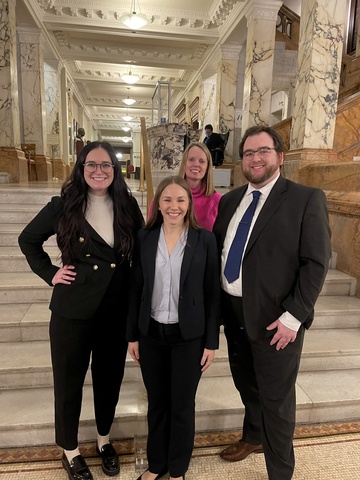Iowa Law's Moot Court team of third-year students—Isabelle Breitfelder, Mike Hegarty, and Kameron Reed—submitted the nation’s top-scoring Respondent’s brief, tied for second place overall for briefs, and made it to the quarterfinals in New York City.
Professor Mary Ksobiech, the team’s coach, said the achievement demonstrates the team members’ hard work and outstanding skills, as well as Iowa Law’s reputation as “The Writing Law School.”

“The competition is an opportunity for students to do high-level writing and research,” Ksobiech said, noting that the competition panels contained some sitting federal judges. “The judges always comment that the students in the competition are more prepared than actual practicing attorneys they see every day in court.”
Ksobiech, who graduated from Iowa Law in 2000, is one of six full professors in the school dedicated to teaching legal writing; many law schools rely on teaching assistants and adjunct instructors for writing instruction.
“Iowa really is the ‘Writing University,’” she said. “There’s a real commitment to writing here that you don’t always see.”
The National Moot Court Competition—with a mission of promoting the “appellate advocacy arts of intellectual rigor, legal research and persuasive argument”—is sponsored by the American College of Trial Lawyers and the New York City Bar Association. More than 120 schools compete each year, with the top teams advancing to the New York City Bar for the National Finals. Iowa’s team was eliminated in the quarterfinals by just two-tenths of a point.
Team member Breitfelder said that the experience has shaped her law education and career plans.
“Although I began law school with a desire to be a trial attorney,” Breitfelder said, “I quickly realized that I would also enjoy doing appellate work. As I was giving my first oral argument ever, I realized I absolutely loved it. It was then that I set a goal to do all that I could with Iowa Law’s Appellate Advocacy programs.”
“Competing in our Appellate Advocacy I and II programs and as a member of the National Moot Court Team has been a fundamental part of my law school education,” Breitfelder added. “Of course, participating in the appellate advocacy programs builds oral advocacy skills, but what I found most valuable was its impact on my written advocacy and legal analysis.”
Ksobiech noted one other benefit to the team’s success.
“Doing well makes up for all the late nights,” she said. “And for putting up with my high expectations of their work.”
